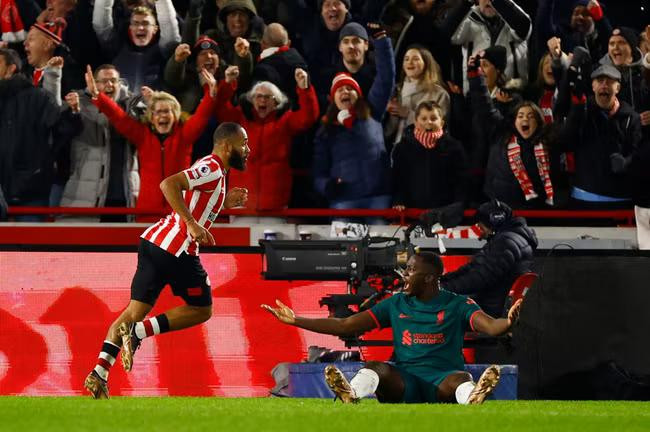The England and Wales Cricket Board (ECB)'s financial projections on the profitability of its pet project 'The Hundred' is largely "disconnected from reality" reckoned Lalit Modi, who conceptualised the vastly successful Indian Premier League (IPL) in 2008. Modi had little doubt that The Hundred will never be able to attain the international audience like the mega-hit IPL. The ECB is looking at potential Indian investors with deep pockets, preferably owners of IPL teams, who have stakes in other global leagues.
The ECB is seeking to privatise The Hundred by selling close to 100 per cent stake in the eight teams of the league. A host of owners of IPL franchises, including Mumbai Indians, Kolkata Knight Riders, Chennai Super Kings, Lucknow Super Giants, Delhi Capitals, Sunrisers Hyderabad and Rajasthan Royals, are believed to be lining up to buy a stake in ECB-run 100-ball tournament, which has seen four seasons so far. Birmingham Phoenix, London Spirit, Manchester Originals, Northern Superchargers, Oval Invincibles, Southern Brave, Trent Rockets and Welsh Fire are the eight teams in The Hundred.
But the former IPL commissioner's series of tweets with charted numbers showed that none of The Hundred franchises can be valued at anything between GBP 5 million to 25 million, let alone USD 1 billion.
"The ECB's financial projections for The Hundred, particularly beyond 2026, appear overly optimistic and disconnected from reality. The International TV rights figures make little sense, given the global competition from other cricket leagues like the IPL.
"It's unlikely The Hundred will attract the necessary international audience to justify these inflated numbers," Modi tweeted.
Modi had offered the ECB a billion dollars to buy the league. On Friday he clarified on the offer, stating on X, "Want to clarify about my billion dollar offer. It was to buy out the tournament in perpetuity and the idea was to redo it as a T20 tournament. Not another new format the global audience has ZERO idea about. Secondly to unbundle it from the ECB media rights. Thirdly 100 per cent ownership. Fourthly distance from the struggling Hundred competition, which comes with its own baggage. My concern now is that they are trying to lure current IPL owners into this non-starter league and build a hype around it that has no justification or guarantees on numbers (sic)."
In fact, Modi, who had wanted to buy out the 'The Hundred' for USD 1 billion for perpetuity but ECB wasn't interested, busted the cricket board's ambitious claims. The ECB has projected the revenue uplift in the media rights deals exponentially. For instance, the England board is expecting to earn 1.8 million pounds (Rs 20 crore) from next year till 2028 and it foresees a growth of over 800 per cent in 2029, when the projected revenue from the India market is 15 million pound (Rs 160 crore). Indian men do not play in The Hundred; women do.
"Domestically, while an increase in TV rights from GBP 54 million to GBP 85 million is plausible, the optimism around sponsorship post-2027 is far-fetched.
"The ECB's hope for sustained sponsorship growth into 2029-30 seems more like wishful thinking than a realistic forecast," said the former BCCI vice-president.
Modi then explained why his "baby" IPL's revenue generation with media rights of USD 6.2 billion is a case of 16 years of sustained growth.
"Even giving them the benefit for 2027-28, there's no solid basis to expect sustained revenue growth at the scale predicted. The ECB's optimism pales in comparison to the IPL, where teams are valued at USD 1 billion based on 16 years of performance.
"By contrast, as per my analysis The Hundred's teams are projected to be worth a mere GBP 5 million to GBP 25 million in the best-case scenario in my MOST CONSIDERED VIEW, with Manchester maxing out at GBP 8.5 million." In fact, Modi claimed that 'The Hundred' can't even match the revenue generated by the Caribbean Premier League (CPL).
"Worse still, 'The Hundred' struggles to match even the Caribbean Premier League's profitability, a sobering indication of its financial frailty.
"The Hundred appears to be on shaky financial ground, with projections that fail to inspire confidence in its long-term viability as these look dangerously overambitious and unsustainable," he further stated.
In the domestic market, ECB earns 38 million pounds a year and expects the value to go up by 125 percent to 85 million pounds in the 2029-32 cycle. "For the next media rights cycle, the ECB and The Hundred teams will consider whether to market The Hundred as part of a broader UK cricket bundle or as a standalone product. If included in a broader package, revenue allocation to The Hundred will be determined in accordance with a fair and transparent model utilising industry-standard metrics," the document, seen by Cricbuzz, mentions.
The document states that rights for the 2025-28 cycle have already been sold for 51 million pounds a year to Sky Sports and it is expecting 3 million pounds a year from the Free to Air (FTA) broadcast deal.
"India Media Rights: contracted through 2028 at an average annual value of 1.8M pounds - the forecast assumes a new deal with an average annual value of 15.0M pounds in 2029, as the world's largest cricket market," the 87-page presentation, states. As Cricbuzz had reported on August 29, the ECB was seeking a Non-Disclosure Agreement (NDA) from interested parties before sharing this Information Memorandum (IM).
Modi took serious exception to the projections, mainly overseas. "They're trying to fool people like this. International rights are worth zero. If you remove that figure, you remove the sponsorship increase. International market is completely a hoodwink as far as I'm concerned. If you look at all the leagues, none of them are able to make any revenue from overseas markets - whether the SA20 (in South Africa), the Big Bash (in Australia), ILT20 (in UAE) or the Caribbean Premier League (CPL)." He goes on to disclose that for the first three years, the IPL was given free of cost in the overseas markets.
Modi also has a strong view on the valuation of a team. The document named 'Project Gemini Information Memorandum' does not mention the cost the ECB looks to sell the eight teams for, but Modi says the English board is expecting close to 300 million pounds for a side. "They are hoping to get a valuation of 300 million. That is where the issue lies. You can buy the team at $5 million. Maybe, for Lords, you can fancy it and put it for $25 million. It's not a worthwhile proposition." He further reveals that the ECB wants the whole valuation paid up front.
In the case of IPL, the franchise payment was staggered and was paid over 10 years. In a social media post on X (formerly Twitter), Modi called the whole privatisation effort a Ponzi scheme.
Contacted, the ECB refused to comment on the revenue projections, team valuations and Modi's assessment.
The formal process to sell to 49 per cent stakes in the eight franchises began at the start of September. The ECB planned to have the sales ratified before the start of next season but Vikram Bannerjee, the ECB’s director of business operations, warned this week that may now be delayed. “The most important thing is we get the right partners,” he told the Business of Sport podcast. “If that takes a bit of time, that takes a bit of time. If in this first round, we [find that] either the values aren’t there for one or all of the teams, or the right partner isn’t there for one or all of the teams, it’s fine. We’ll just carry on running it, we’ll do another year.”
The sale of the Hundred is the first time the ECB has welcomed private investment into the English game. Richard Gould, the chief executive, and chairman Richard Thompson remain strong supporters of the county game and resisted temptation to sell the competition in its entirety.
In 2023 the ECB turned down £400m for a 75 per cent stake in the Hundred from the Bridgepoint Group. Modi fronted a $1bn bid to buy the Hundred earlier this year, although talks did not progress very far.
Instead the ECB has gifted a 51 per cent stake to the grounds that host a Hundred franchise and will sell off the 49 per cent interest it retains, splitting the money between the counties who hope the windfall will solve debt problems and protect their futures. However, if Modi’s valuation is right then the expected windfall will be a lot smaller.
There are strong disclaimers on page one of the ECB document about the figures they have put forward. “No representation, warranty, assurance or undertaking is given as to the achievement or reasonableness of any future projections,” it says.
Potential buyers will have to weigh up whether they will get a justified return on their money. Modi says the figures show the franchises will be around as profitable as the Caribbean Premier League. The documents predict that London Spirit will offer an EBITDA of £1.3m in 2026 rising to £8m in 2029 if the ECB meets its ambitious aims for television and sponsorship revenue that Modi believes are unrealistic, and the board itself states are not binding.
The 87-page document sells the Hundred as “dominating the British summer sporting calendar” as the ECB tries to tempt buyers. It also boasts that the Hundred is the “premier destination for men’s and women’s global cricket superstars” despite a less-than-stellar roster of overseas men’s players who appeared this year with stars such as Pat Cummins choosing to play in Major League Cricket in the United States instead and Indian players not available.
The document also highlights WG Grace and Alastair Cook as examples of great English short-format players, despite the former dying nearly 100 years before the invention of T20, and the latter never participating in the Hundred.
This IM has been issued on behalf of the ECB to a select number of recipients on signing the secrecy pact. It says, "Investment in The Hundred is a rare opportunity to shape the future of a premier sports property and capitalize on its significant growth potential."
ECB currently owns 100% of The Hundred competition and all its teams
ECB will sell at least 49% of each of the eight teams to new investors with the vision, experience and capabilities to propel The Hundred to new heights
ECB then plans to gift its remaining stake in each of the teams to their respective hosts, creating a lasting partnership between new investors and some of the world's iconic cricket institutions
As a part of this process, hosts will also have an option to sell a portion of their equity in the teams to the new investors to provide a path to a control position
Governance, commercial and other aspects of the host / team / investor relationship will be negotiated prior to closing to formalize the collaboration framework."
It further says, "This Information Memorandum contains forward-looking statements that involve substantial risks and uncertainties, and actual results and developments may differ materially from those expressed or implied by these statements due to a variety of factors. These forward-looking statements speak only as at the date of this Information Memorandum."
The IM adds, "The ECB reserves the right, without giving reasons, at any time and in any respect, to amend or terminate the proposed transaction, or to terminate negotiations with any prospective purchaser. In particular, the new operating model set out in this Information Memorandum is subject to change and the ECB reserves the right to amend the equity structure of any team at any time prior to completion. By accepting this Information Memorandum, the recipient agrees to be bound by the foregoing limitations."
The ECB has employed Raine Group to oversee the sale, an American bank that is also handling the sale of The Telegraph and was recently involved in the sale process of Manchester United.
If the Hundred is to realise English cricket’s hopes, it will need to thrive abroad. The ECB’s document to prospective investors projects that the value of Indian TV rights for the Hundred will soar from £1.3 million to £15 million by 2030; the North American TV rights will rise even more steeply, from £200,000 per year to £15 million.
By 2030, the ECB projects, total international broadcasting rights will surge 15-fold: from £2.1 million a year to £32.9 million. Such ambitions ignore a sobering truth: even in a globalised age, most leagues are overwhelmingly dependent upon their domestic markets to generate revenue. Premier League football is the only major sports league in the world to generate more income abroad than at home.
The ECB is right in one sense: cricket in the United States is growing. Yet North American cricket fans already have abundant options. Generally, supporters there follow a mixture of international cricket and the Indian Premier League. Since last year, they have also had a good quality local competition to watch: Major League Cricket, which has had enough cash to attract more of the sport’s biggest names than the Hundred. Major League Cricket plans to expand in the coming years. Yet the ECB is now planning to make US fans also embrace the Hundred – which will continue to be played at a very similar time of year to Major League Cricket.
“The sums involved look optimistic, particularly in the context of global sport rights – it is a leap of faith,” says Rob Wilson, an expert in sports finance. “Many US cricket fans have an affinity with the IPL in India. Coupled with US interest in their Major League Cricket, there will be huge competition for The Hundred to get eyes on screens.”
The time difference presents another challenge for the US market. Most men’s Hundred games start at 6.30pm local time: 1.30pm in New York, and 10.30am on the west coast. A senior figure in another major T20 league, which has also tried to cater to the US market, told Telegraph Sport there is “no chance” of the ECB meeting its projections for North America by 2030. The only exception, he said, is if Indian players appear in the competition.
“If this league can’t convince people they have the very best players, then no,” said David Berri, professor of economics at Southern Utah University, about the Hundred’s prospects of meeting its financial target in the USA. To build its appeal in the US, he said, the Hundred needed both to convince fans that it had the world’s best talent, and time.
Indian players would also be transformative for the Hundred’s hopes of earning £15 million a year in broadcasting rights in India by 2030, an 11-fold increase on current figures. Yet there is little chance of leading Indian players being permitted to play in overseas T20 leagues at any point soon. Leagues in the Caribbean, South Africa and the United Arab Emirates, after all, already have an array of Indian owners affiliated to Indian Premier League teams; Indian players have still been barred from appearing in these competitions.
“Indians don’t love cricket,” a senior figure in Indian broadcasting told me a few years ago. “Indians love Indian cricket.” It is a truth that T20 leagues the world over have long learned. Earlier leagues in South Africa and the UAE, which were due to launch in 2018, with a business plan predicated on attracting significant interest from Indian fans, were both cancelled before a ball had been bowled: they were not financially viable.
Without Indian players, it will become even harder for overseas leagues to monetise the Indian market in the years ahead. The Indian Premier League is considering a further expansion, which could further damage the demand to watch overseas leagues. A more serious problem for the Hundred is a looming merger between Disney and Reliance Industries, the two biggest broadcasters in cricket. This is likely to exert a downward pressure on broadcasting rights, because there will be less competition: it is as if Sky Sports and BT Sports merged. Even without such obstacles, the Hundred’s prospects in India are also hindered by the time difference: a 6.30pm start in England equates to an 11pm start in India.
By 2030, the Hundred’s document outlines, the ECB hopes that the competition will generate 25 per cent of its revenue overseas. That would put the Hundred in rare company: the IPL only generates four per cent of its revenue abroad, the NFL just two per cent.
Over the first 21 years of T20 cricket, an iron law has held true, as one prominent figure in an established overseas league observes: “You make your money locally”. The ECB’s gambit is that this will now change. Whether potential investors agree will go a long way towards determining whether English cricket can raise the £500 million that it has targeted from the Hundred sales.
Broaden your horizons with award-winning British journalism. Try The Telegraph free for 3 months with unlimited access to our award-winning website, exclusive app, money-saving offers and more.

















